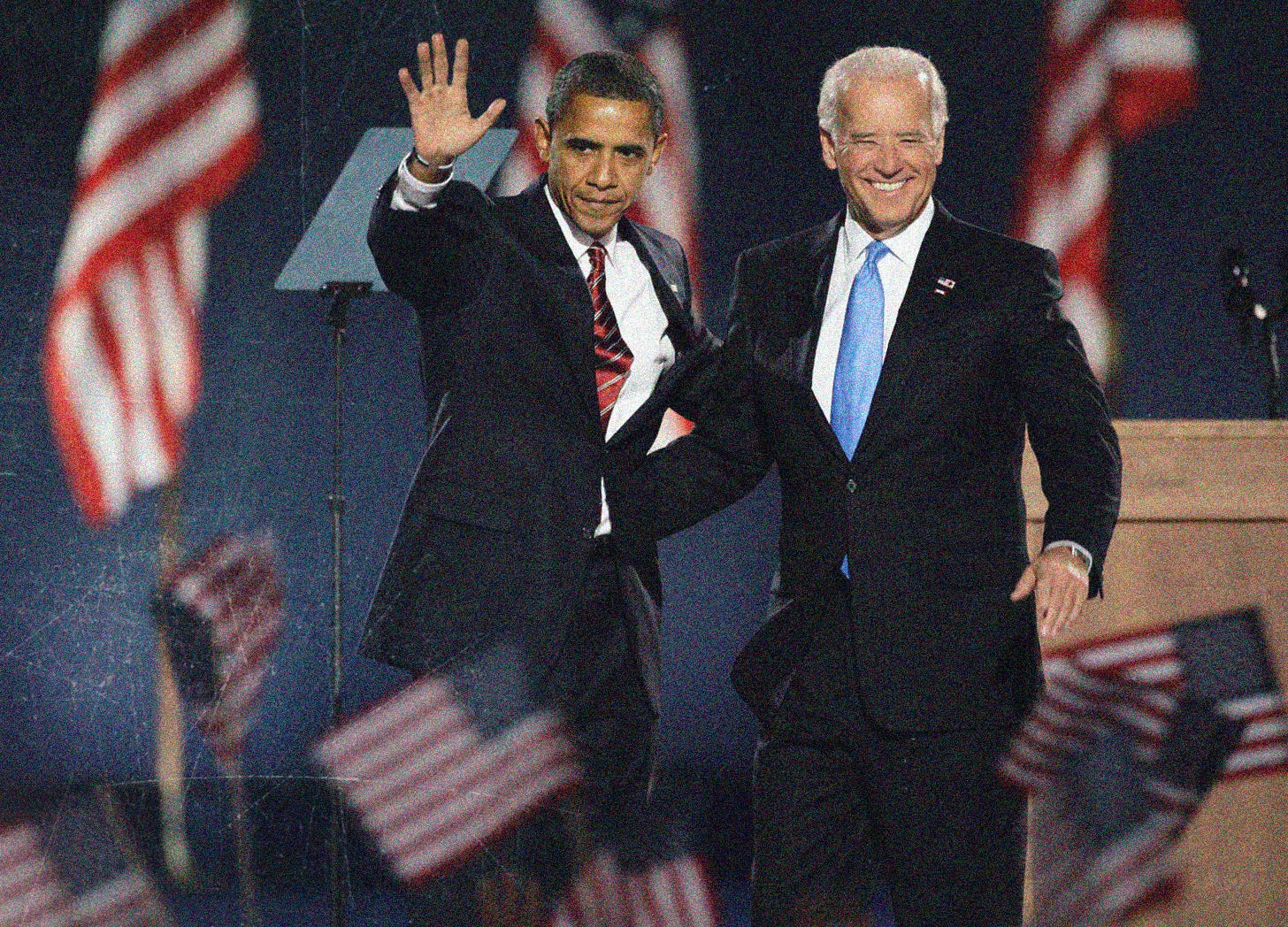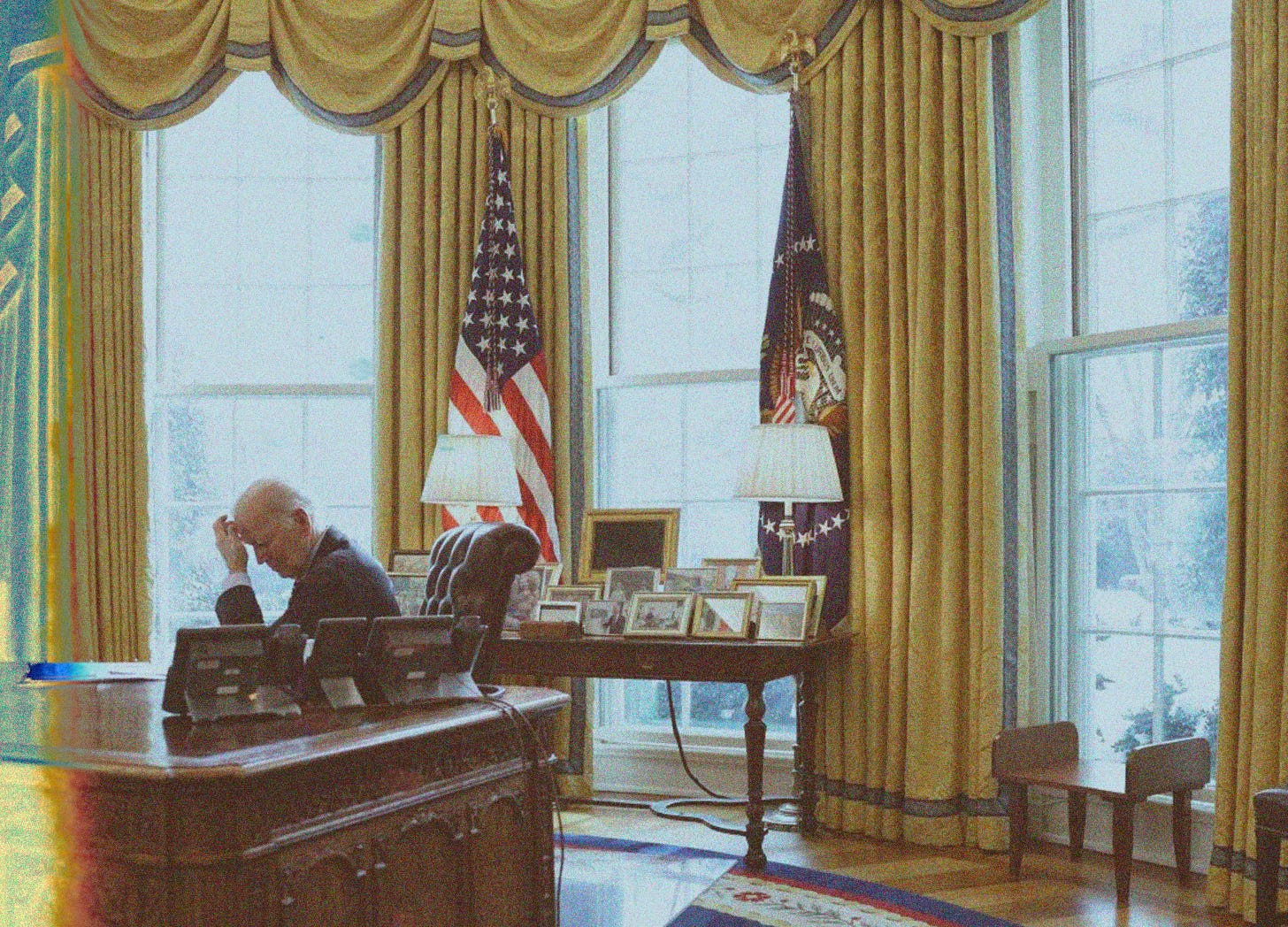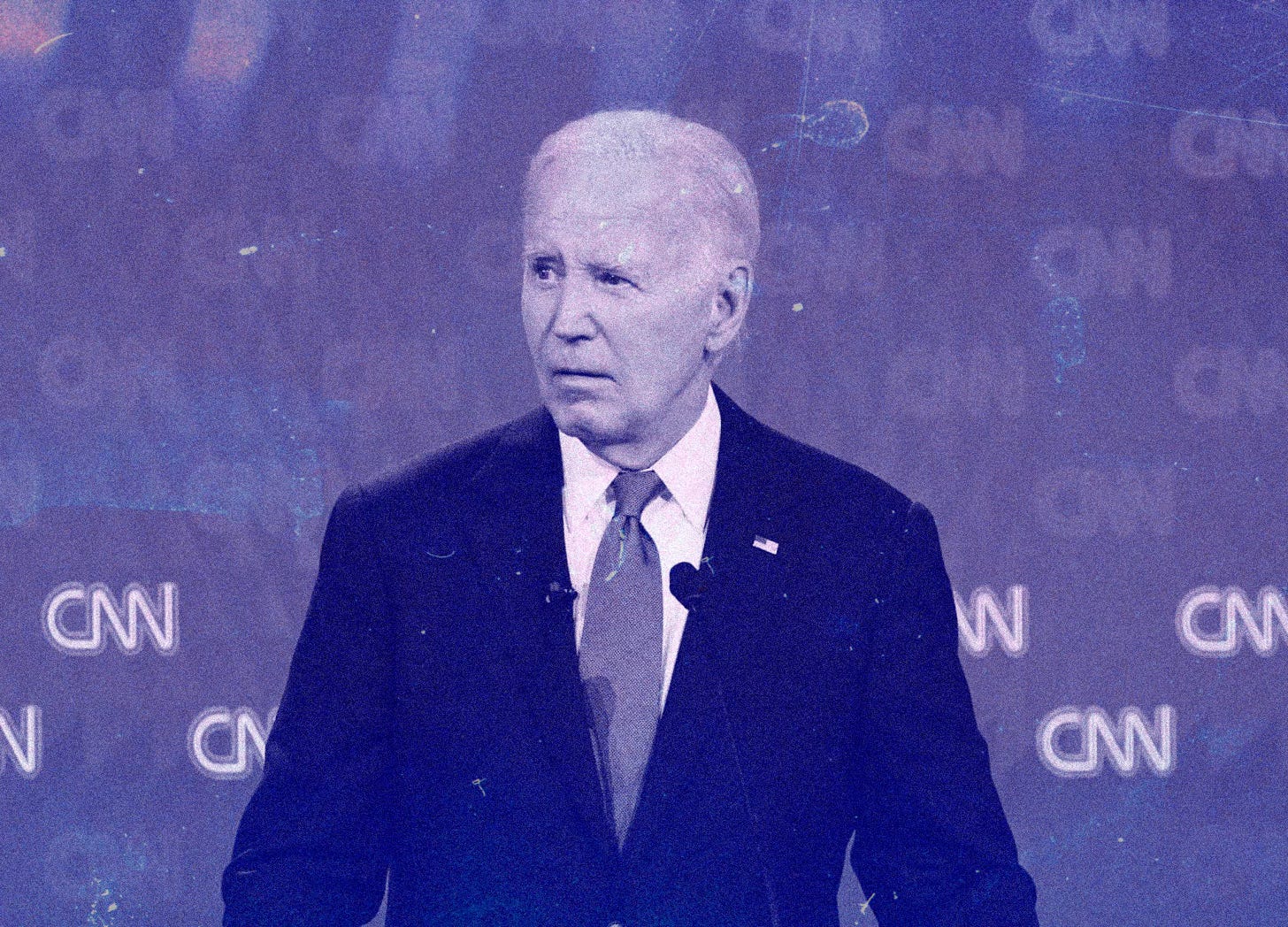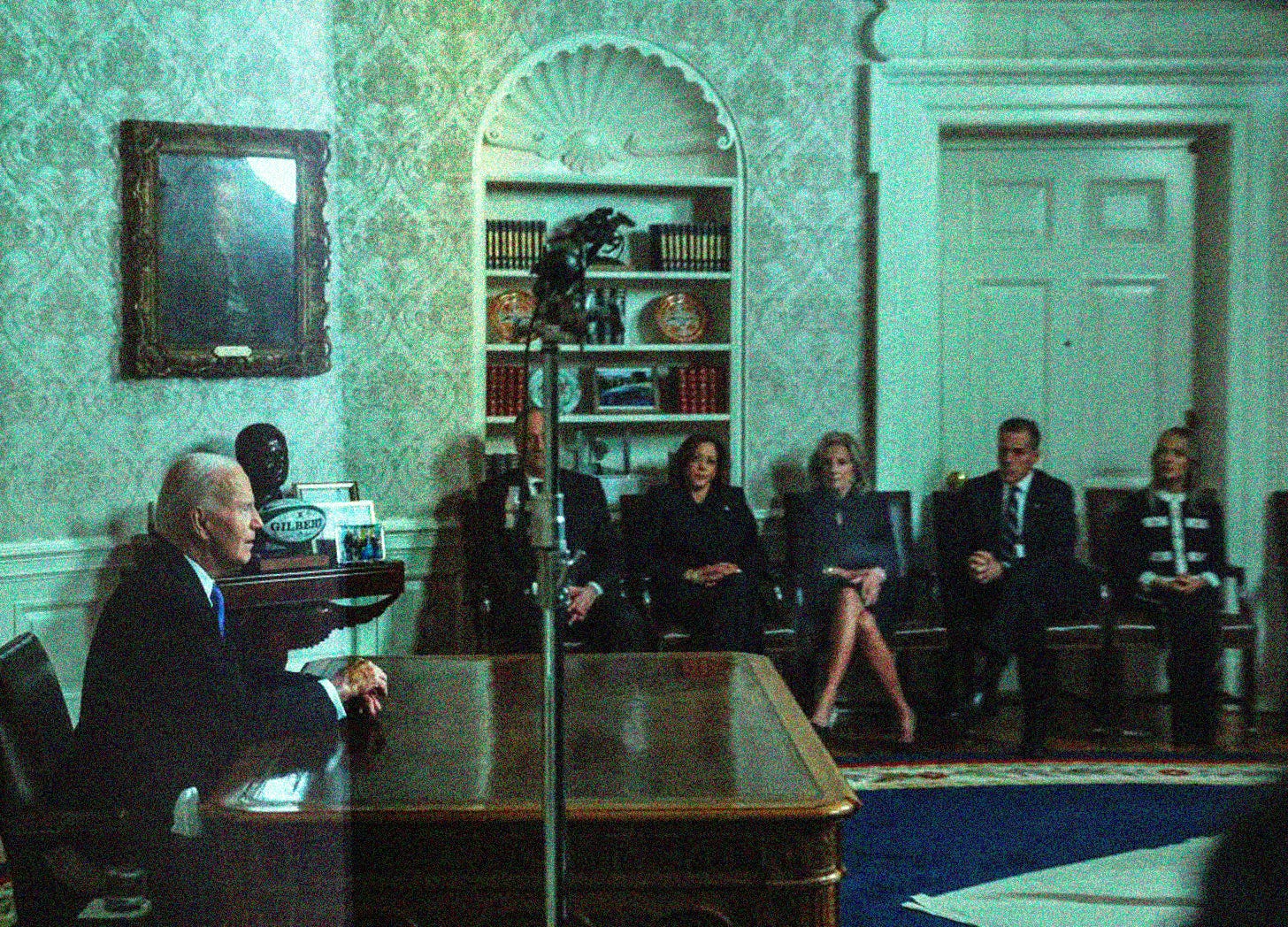The World Biden Wanted
History likely won’t look fondly on the President. It wasn’t for a lack of trying.
On June 13th, 2008, the now-nominee Barack Obama had to make a decision. He needed a running mate. The question was, who? After a bruising primary fight against Hillary Clinton, there was real worry that white women would fail to show up and support Obama without an electoral offering. That could mean Kansas Governor Kathleen Sebelius, a Democrat in a red state who could, in addition to bringing in women, help bridge a message of bipartisan unity. There was risk in that, though, as the country may not be ready for a Black President and female Vice President on the ticket. Perhaps Obama, who was a clear favorite in 2008 against a beleaguered Republican Party, could play it safe. Evan Bayh was a sitting Senator from Indiana, a state the Obama campaign believed was in play and would almost certainly prevent a McCain victory. Even Tim Kaine, the Governor of Virginia, who Obama nearly selected but refrained from choosing due to worries that “two relatively young, inexperienced, and liberal civil rights attorneys” would scare away voters.
Yet none of these people were selected to join Obama on the ticket. For all their bluster, accomplishments, and accolades, the Vice Presidency was offered to a little-known Senator from a little state in Joe Biden. When Obama called Kaine to break the news, he reportedly told the Governor, “You are the pick of my heart, but Joe is the pick of my head.” For Obama, Biden offered unusual upside while still adhering to the general risk-averse nature of a campaign and candidate in the lead. For Biden, he was offered the ability to finally rise above failed primary campaigns and early dropouts and become the national figure he had wanted to be for so many years. For the first time in his life, Joe Biden looked like he would have an earnest chance to become President of the United States
Eight years came and eight years went. The country was more partisan than ever before, and Obama had lost much of the bluster that he held coming into office almost a decade ago. Still, the economy was strong, and the Republican Party lacked a true superstar that could turn a 40-60 election into a 70-30 election. Traditionally, the sitting Vice President of the incumbent President would have proverbial first dibs over the nomination. They got the best staff members, the most funding from party elites, and the buzz from media outlets across the coast. Yet, by 2014, Biden was not the talk of Washington or the subject of Democratic strategists but instead the attention of the operative class focused on Hillary Clinton. Hillary, and Obama, moved quickly to suffocate a Biden 2016 campaign by arguing he would not be able to survive a primary and would tarnish his legacy, a word Biden is acutely sensitive to. Biden acquiesced quietly and loyally but nonetheless angrily. It was his right to lead the party, his job to lead the country, and his destiny to change the world in his vision. Yet Biden stayed quiet, accepting that if Hillary won, which she by all accounts would, he would likely never get a shot to become Commander in Chief.
“A lot of people ... were encouraging me to run in this period, except the president .... [Obama] just thought that [Clinton] had a better shot of winning the presidency than I did."
We know, though, that Hillary didn’t win. Working-class white voters defected from the Democratic Party en masse while enthusiasm flatlined to such an extent that “look at the policies, not at the people” became one of Hillary’s closing arguments before election night. One by one, the Midwest flipped red. First Ohio and Iowa, which had been trending rightward since 2012, but then Pennsylvania, Wisconsin, and even Michigan started looking scary. Turnout was down in the urban centers Hillary needed, while counties that Obama had won handily just four years ago flipped completely to Trump. The greatest upset since Truman defeated Dewey was on display for a Democratic operative class that had feared Jeb Bush more than Donald Trump.
On that night in 2016, when the very idea of where this country was and where it was going was fundamentally redefined, I have to imagine Biden thought about 2020. The working-class voters that looked to be handing Trump the election were his crowd; they were his people. He was the kid from Scranton, Pennsylvania, who had supported unions for decades. He could have won this. He should have won this. It was his election, and he should have been the one to uphold the legacy of the man he had worked with for eight years. The sitting President and leader of the Democratic Party who he had campaigned for, who he had lobbied for, who he had served, who, despite all of his loyalty, still denied Biden the right to the office he wanted. In four years, he wouldn’t be dissuaded against running; he would run, and he would win. He would prove the people who had written him off as a career politician, who said he was too old, too moderate, too Washington, to ever win.
The campaign started strong for Biden. The Democratic Party wanted to win. Period. Biden promised victory in November and hit hard and often that he was the candidate to beat Donald Trump and return the world to normal. Up until Iowa, every candidate would rather have switched places with Biden. Then Iowa held their quadrennial caucus, and Biden would come in fourth place. For a candidate whose main selling point was the ability to win, this was a setback. Both Bernie Sanders and Elizabeth Warren placed ahead of Biden, weakening Biden’s ability to assemble a moderate coalition. This is all in conjunction with the fact that Pete Buttigieg, a young upstart candidate, had surged to first place and captivated the Democratic Party. New Hampshire would prove just as bad, notching only eight percent, again falling behind Buttigieg and Bernie among others. Nevada, the third state holding primary elections, again delivered a decisive rejection of a Biden candidacy and a warm embrace of Bernie and progressive populism.
Was this it? Had Biden’s time passed? Had it even ever existed? For all of his objections over being dissuaded in 2016, Hillary still was the clear early choice for the primary electorate. Biden had run, at this point, four presidential campaigns, and it looked like all four would end in embarrassment. The last chance at a revival was in South Carolina, with a contingency of moderate Black voters who Biden had deep ties to as Vice President and Senator. There was talk of dropping out if things did not work out, and some staffers had been preparing to find a new job in a few weeks. In perhaps the last plausible moment possible, Biden began his comeback. He won South Carolina in a dominating fashion, securing nearly 50% of the vote against five other candidates. Money came pouring back in from previously wary donors, and Biden looked to have a fighting chance again.
Biden won the nomination by corralling other Democratic candidates to resign and endorse him, and forcing Bernie further and further away from building a sustainable coalition. Biden even secured the endorsement of Elizabeth Warren, who shared much more policy similarities with Bernie than with Biden. As COVID accelerated, it became impossible for Bernie to run any semblance of a normal campaign without putting lives at risk. Bernie would drop out in early April. Biden was the nominee of the Democratic Party. There was much to be fought, as Trump would not go down without a fight, but there was time to appreciate that Joe Biden was inching closer to the Presidency. The last thing that stood in his way was the man whom Joe Biden hated perhaps more than any other. A man who stood for virulent self-interest and who was presidential in title alone.
2020 was an unusual election cycle, to say the least. Held in the middle of a pandemic and in tandem with dramatic social unrest, the country felt like it was burning down. Trump, defiant in the face of public health officials, pursued large rallies and continued in-person operations for Republican operatives going door-to-door. The ability for just one party and candidate to exercise the most effective voter turnout method, that being in-person solicitation, would usually lead to a lopsided outcome for the party in question. Conversely, though, Trump had miserably failed at managing the pandemic and handling racial tensions across the country, in effect balancing out whatever logistical advantage he may have held. The U.S. still has an extraordinary ability to rally around the flag in the face of national tragedy, and Trump was given much more sympathy from voters than most would expect. This was no 2008. Voters could see that the financial recession was caused by the pandemic, which many did not completely tie to the previous robust economy that Trump had governed over. Biden would have to fight to win this election while also remaining aware of the insurgent progressive faction demanding a leftward shift while still catering to the moderate base that had elected him. A tall task.
Biden would win, ultimately. A scary win, an uncomfortable win, a win that was not near as swift as Trump four years earlier or indeed four years later. But it was a win. Biden flipped the Rust Belt and opened up new electoral opportunities in the South that the party could build a future on. There were some down-ballot misses due to Biden’s underperformance, including Susan Collins in Maine and Thom Tillis in North Carolina. Still, though, the Democratic Party would hold a majority via tiebreaker in the Senate and controlled not just one but both of Georgia’s Senate seats. Biden had done it, finally, over thirty years since he had first run for President. Joe Biden would become President of the United States. It was time to return the country to normal.
Joe Biden took the oath of office on a family Bible dating back to the nineteenth century. A family heirloom that his son, Beau, had swore on when he became the Attorney General of Delaware and that Biden himself had used when he was elected to the Senate in 1972. Biden takes great pride in his family name and makes it a point to reference a “Biden promise” as something unshakable and ironclad. Biden had ambition, as any President does, but he also had pride. It was not just Biden ascending into political royalty, but by extension, the Biden family. The success of his future administration would be the success of not just President Biden but the Biden family. This viewpoint, not of just personal legacy but of familial legacy, explains so much of how Biden would operate during his four years. Biden was President now, and that meant fulfilling the promises he had made on the campaign trail.
The first major foreign policy decision taken by the Biden administration would be to withdraw U.S. troops from Afghanistan. Biden had long called for the withdrawal of troops in the country and took great pride in being a President under whom no troops were in active combat. Obama had tried and failed, just as Trump after him, to remove troops completely from Afghanistan. Biden did what both men had failed. Expectations that the current Afghan government could maintain tactical control over existing territory long enough to allow U.S. forces to leave and individuals who would be targeted by the Taliban to extradite to the U.S. were wrong. In dramatic fashion, the Taliban took control of the country in just ten days, and horrifying photos of refugees clinging to the wings of planes spread across the country.
"I stand squarely behind my decision… After 20 years, I've learned the hard way that there was never a good time to withdraw U.S. forces."
It was not only humiliating for the Biden administration, it was humiliating for Biden as a President. He had come into office promising strengthened alliances and deliberate leadership abroad. The failure to withdraw and the media that spread across the world made Biden, and the United States, look weak. This was a rare moment in which truly all sides of the military establishment looked feckless and ineffective. The intelligence community wrongly believed that the Taliban would be held off, and military leaders were unprepared for an urgent evacuation. As the last planes took off from Kabul, the Taliban found itself with a plethora of armor and equipment left by the U.S. during the evacuation. What should have felt like a weight being lifted from the shoulders of our country turned into the feeling of bitter defeat. From the withdrawal onwards, Biden would never again break fifty percent approval, and the veil of responsible statesmanship would forever be pierced.
The shattered image at home of Biden and his administration would continue to fester, but abroad the consequences may have been more dramatic. A peculiarity of history and great powers is the consistent overconfidence in the fighting force of the domestic state. Time and time again, the great powers send their militaries to what should be a swift victory and get trapped in a bloody and long defeat. When Vladimir Putin saw the failure in Afghanistan, according to Supreme Allied Commander General Tod Wolters, as an opportunity to exploit an America on the backfoot and a Europe unwilling and unready for war. Would Biden really be willing to go to war over Ukraine after failing so publicly in Afghanistan? It was a bet, in Putin’s mind, that was worth taking. To be very clear, the relationship between Afghanistan and Ukraine is purely speculation, and there were many other more significant factors at play for Putin and the U.S. Still, our adversaries noticed the failure and particularly the embarrassment from Biden and his national security team.
A failed Middle Eastern operation is far from unusual of American Presidents in the twenty-first century. In four years, voters would be focused on new issues and different debates, and the legacy of Afghanistan could fade away from view. Mistakes were made, but Biden hopefully had learned from them. NATO was still strengthened, the great powers still at peace, and the world hopefully could calm itself back down. Domestically, Biden had secured the American Rescue Act, the Bipartisan Infrastructure Law, and more. Biden had delivered on his ability to get legislation done, a talent Trump never possessed or cared to learn. Biden had returned Washington to some sort of normalcy, but rampant partisanship and division still hardened across the country. The ability to sell the Biden agenda weakened as the economy stagnated for everyday Americans, something that Biden would yet again be too prideful to acknowledge.
Then the most important geopolitical event since at least 9/11 slowly began to form. First, it was concerns that Putin was strongly considering an invasion of Ukraine and that the Russian military was preparing a full-scale invasion if certain conditions could not be met by Ukraine and the West. The exact timeline of Putin’s decision to invade is murky and no doubt made more vague by the idea that the Biden administration could have prevented the war in the first place. These are difficult matters to fully know, and playing the hypothetical game with foreign policy quickly loses any basis in reality. Regardless, there was clear danger that Putin was considering war in Europe for the first time in almost eighty years. Should Putin go through with the invasion, the onus would immediately be placed on NATO and, by extension, the United States to respond.
The Biden Administration entered public and private dialogue with Russia to dissuade Putin from invading. The consensus, as confidently wrong as in Afghanistan, was that it was unlikely Putin would invade. The costs would be too high, and fighting too atrocious to throw away what relationship remained between Moscow and the West. While the intelligence community did provide crucial intelligence that decidedly pointed to Putin leaning towards war, there was still debate among foreign policy experts across Washington and inside the White House. War in Europe would be uniquely disastrous to the Biden administration and Biden personally. The President had spent much of his life in the Senate handling relations with the Soviet Union and strengthening ties between the U.S. and other allied European countries. His belief in this relationship was foundational to his view of the world, and Russian success in Ukraine would put conflict between the two great powers squarely on the map.
The pride in this relationship and of the United States as a bastion for democracy was not going to allow for any reconciliation from Russia’s stated concerns of general NATO involvement in Eastern Europe. Whether these concerns were legitimate and could be resolved will never be known, but it can also be said that Biden was not interested and would never be the President who scaled NATO down. Pride yet again got in the way of at least an attempt at peace, particularly considering the fact that Ukraine gaining NATO membership was de facto barred due to concerns over aggravating Russia. That de facto ban on membership begs the question as to why the U.S. did not even attempt to offer Ukrainian neutrality if NATO membership was never going to occur in the first place. The reason, of course, is pride. Negotiations failed, and the Ukrainian people paid an enormous price. I do want to say, for the record, that the blame should solely be on the dictator who invaded a sovereign country and not the Biden administration for not acquiescing to every demand of Putin.
On the morning of February 24th, 2022, Russian troops poured over the border on almost every side, and yet again the consensus in Washington was confidently incorrect. Kyiv did not fall within days, as both Putin and Biden had believed, and the Ukrainian military was able to hold their own against a larger, better-funded, and more experienced fighting force. If Afghanistan was embarrassing to Biden, the failure in Ukraine was existential to Putin. Even the terminology emanating from the Kremlin of a “special military operation” insinuated a confident belief that Ukraine would fall swiftly and before the West could react. Biden was able to cajole a discombobulated Europe into rapidly supporting Ukraine with ammunition and weapons that could continue Ukraine’s defense and hopeful counteroffensive. Biden deserves credit for the initial response to the war, and few Presidents would have had the immediate ability to regroup NATO and fund Ukraine. Ukraine would begin their David-and-Goliath counteroffensive into Kherson, Mykolaiv, and Kharkiv with dramatic success.
The initial blame for the war in Ukraine from the American people rested solely on Putin for obvious reasons. Biden, even if a war in Europe was raging, could show the American people why exactly they elected him. He had defended Ukraine with vigor and strength, but Russia always held a long-term advantage in men and will. Western resolve to defend Ukraine indefinitely could not be guaranteed, a fact that all parties were well aware of. The opportunity to push Ukraine towards a ceasefire in late 2022 and early 2023 was perhaps the best chance the country would have at gaining leverage during negotiations. Russian troops were on the run, Putin had undergone a failed coup attempt on his regime, and Western support for Ukraine was strong. Again, I and no one else can know how ceasefire talks with U.S. urging would have gone, and if they would end any differently than the failed Istanbul talks earlier in the war is unknown. The fault is not that Biden tried and failed; it’s that he did not try at all.
The inability to see the long-term trajectory of this war is directly consistent with Biden’s failure to see the world as it is and not what it could be. Yes, Putin was wrong morally and strategically for invading Ukraine. It was a violation of international law, and Putin deserved to face the consequences of his action, just as Ukraine deserved full territorial returns in addition to aid from Russia to rebuild the cities they had destroyed. All of that can be true, and the question can still be: what was the U.S. going to do about it? March into Moscow and arrest Putin? Send U.S. troops into combat against Russian troops and ignite nuclear war? Just as the West began to take Putin’s nuclear threats less seriously, Russia treated American finger-wagging as bluster that would never be backed up with American or NATO troops. The pressure on Ukraine to capitalize on their advances was not conveyed with enough thought and was ultimately ignored by a resurgent Ukraine. Biden would not exercise the levers of diplomacy needed to get serious negotiations underway and would continue straddling the line between direct war with Russia and supporting Ukraine with the tools they needed to win.
This line would become increasingly difficult to walk the more that Ukrainian forces pushed back. The Ukrainians wanted more lethal weaponry and direct support from the West, including a no-fly zone, that they determined was needed to fulfill their war aims. Russia, and more accurately Putin, saw defeat in Ukraine in a personally threatening manner that would allow for previously unthought-of nuclear threats, and, if the need arose, nuclear detonation. Biden and his national security team thankfully understood the gravity of these risks and resisted calls for escalation during the early phases of the war. “Salami-slicing,” or the incremental escalation that avoids any singular significant escalatory action, has kept the world from a nuclear bomb being detonated and the fundamental reshaping of war in the twenty-first century. Yet again, the Biden administration successfully reacted to the immediacy of a crisis but failed to gain any long-term strategy.
“I don’t think there’s any such thing as an ability to easily use a tactical nuclear weapon and not end up with Armageddon.”
Biden would never have domestic support for U.S. troops in Ukraine, even if he had wanted to. Too often during this crisis, the President operated in favor of his own legacy rather than the defense and security of the American people. Inability to negotiate and unwillingness to deploy the troops Ukraine needs to win creates an unsolvable stasis for any hope of diplomacy in the region. Biden never wanted to be the President who left NATO at the altar, and Putin’s alleged aims of Eastern Europe made the defense of Ukraine all the more critical. For all of the President’s experience in European foreign policy, there never was clear communication from the leader of the United States over what our country was doing in Ukraine, a non-treaty ally, and what risks the country was willing to take to achieve our aims. The lack of clear communication other than pleasantries about “Democracy” allowed for Trump to run with the idea that the world was on the brink of World War 3.
I do appreciate and understand the work the administration has taken in both public and private channels to restrain Russia from massive escalation. I have grave concerns over the ability of the Trump administration to act with such prudence. I also believe that not leading the world into nuclear war is perhaps the lowest possible bar that the President of the United States has. Biden is well aware of the dangerous impetuousness of Donald Trump, which makes the stubborn refusal for any concerted ceasefire all the more stunning. Now, Donald Trump, a man who nearly took the country to nuclear war once before, will inherit a Ukraine that is clearly on the retreat and a Russia that is willing to wait out the West even longer. Should Trump fail to secure a ceasefire, it is entirely possible that he will engage in far more escalatory actions to pressure Putin back to the negotiating table. This escalation will be managed ultimately by two men with notoriously short tempers and who have aged considerably in cognitive function.
There had always been whispers that behind the scenes Biden was faltering mentally. Moving slower, talking quieter, more protected by aides, the Biden White House often felt detached from the man who was at the helm. Still, these rumblings were mostly resigned to right-wing publications and internet forums. Biden had certainly lost some of his vigor, that much was clear, but there was still faith that he was operating the country under his vision and his vision alone. The lack of press conferences and interviews went mostly unnoticed by the general public, perhaps because of the sheer amount that his predecessor would hold during 2020. Trump had been labeling Biden as “Sleepy Joe” and mocking his decision to largely campaign from his basement in Wilmington, Delaware, two years earlier. Biden was old, but so was Trump, and the idea that the sitting President would be approaching senility remained trapped in Washington.
Biden would announce his campaign for re-election in April of 2023 with a short three-minute video on social media. The video is quintessential Biden, for better or worse. The man who gave his life to his country and to his office and who genuinely believed that there was hope to fight against the partisanship and viciousness that had begun to define American politics. In classic Biden fashion, the message he wanted to start his campaign off was his message and his message alone. Fundamentally, Biden believed in the American people and their ability to put the well-being of the state over any other issue. Democracy would be the centerpiece of the Biden 2024 vision, executed by those who he had known for decades. He had kissed more babies and shaken more hands than most politicians in history over his five-decade span in politics. He knew this country, and he knew they were better than Trump.
“I know America. I know we're good and decent people. I know we're still a country that believes in honesty and respect. And treating each other with dignity. That we're a nation where we give hate no safe harbor. We believe that everyone is equal, that everyone should be given a fair shot to succeed in this country.”
I found myself surprisingly emotional watching Biden’s 2024 announcement. It’s eerie, in a way. Biden is spliced into the advertisement in short snippets, sounding about as alive as the teleprompter he read from. A majority of the video includes previous speeches and events that Biden had held during his last campaign,. Perhaps what makes me saddest is just how out of touch the message of this video is with the country at hand. Biden believes in a country that is no longer real. His stubbornness, which when in the realm of geopolitics is dangerous, turns into a sense of pseudo-pity when viewed through the lens of his re-election. When bipartisanship was inherent to federal governing, when there was dignity to elected office, when the Capitol building was the pillar of democracy worldwide. It’s a message that is so out of touch with the current conditions, so uninspiring to the average voter, and so completely Biden.
The re-election campaign would chug on as a slight underdog to Trump and a considerable underdog to any other candidate. Quickly, Trump would look to be the clear favorite for the nomination as the field winnowed around an imploding DeSantis campaign and a zombie Haley campaign. There would be a rematch of two candidates that a majority of the country agreed were too old and too unpopular to run. Yet, run they would. Biden would have a final chance to reclaim the country he had grown up in, and Trump would have his last shot at reshaping the country under his image. Biden’s talk of the “soul of the nation” was exaggerated but, in many ways, correct. There was much at stake for how the country would operate over the next four years, and Biden wanted nobody else but him to fight for his vision.
On October 7th, 2023, the Biden administration would once again face an international crisis. Hamas, a terrorist organization burrowed in Palestinian territory, would launch an attack on Israel, leading to the death of over 1,200 people. Biden would immediately extend his support to Israel and Prime Minister Benjamin Netanyahu, a move that would solidify the unpopular Prime Minister in the immediate aftermath of the crisis. Quickly, the Biden administration developed a “bear hug” strategy of keeping Israel close and asserting influence through genuine trust and support. Biden was well aware of the never-ending conflicts in the Middle East and was determined to deter Israel from pursuing revenge in brutal fashion. There could be a way, he and his team conveyed, that Hamas would be permanently incapacitated while also preventing regional war and untold bloodshed. Israel would not listen.
It’s important to note when thinking about Biden and his administration’s approach to Israel is yet again the era in which Biden grew up. His support of Israel and belief that they are a core ally of the United States is born out of his belief that the world is inherently a battle between democracy and autocracy. That tyranny would either be destroyed or would conquer the world. Israel, a democratic country in a region ripe with the opposite, was at the very core of the world Biden wanted. He would not abandon them, ultimately, a fact that both the world and Netanyahu would learn quickly. Over and over, the Biden administration would privately press concerns over Israeli actions in Gaza, making sure to leak their “strong opposition” but ultimately acquiescing and continuing to support what quickly was turning into a humanitarian disaster.
Israel was dictating U.S. policy in the Middle East with fervent disregard for whatever moral objections the President and his team may have. No matter how many times Biden called Netanyahu, and how many times his team leaked that Biden called Netanyahu, nothing seemed to change. Naturally, and understandably, many quickly believed that Biden did not truly want the ceasefire he claimed to be working so hard at. Why would Biden not exercise any of the leverage he held over Israel? Even when supposed red lines were crossed in Rafah, the Biden administration still continued to reaffirm their “ironclad” commitment to a nation, and more accurately a Prime Minister, with a far more risk-accepting appetite than the U.S. Biden was either lying, and he did not care about an end to the war or civilian casualties, or he was a fool and could not execute his vision. Both were damning on the man whose identity as a respected statesman at home and abroad had quickly worn away.
“The defense of Israel is still critical, so there’s no red line I’m going to cut off all weapons so they don’t have the Iron Dome to protect them.”
I do believe, though, that Biden wanted a ceasefire. He did, in my view, earnestly care about reducing civilian casualties and pushing Israel towards an end to the war. He just wasn’t willing to let go of what he viewed as the bastion of democracy in the Middle East and a core ally of the United States. However reprehensible the casualties or dangerous the escalation, Israel had still been by the U.S. and the U.S. by Israel for all of Biden’s life. Rather than viewing Israel for what it is, he treated it for what he wanted it to be. Netanyahu quickly grew aware of this fact and learned that no matter how many wags of the finger he and his administration would give, Joe Biden would always be by their side. So Israel invaded Lebanon, dismantled Hezbollah, risked open war with Iran, and continued to put little care into the lives of civilians.
Biden was the President, but he also was a politician. The war in Gaza had sparked student protests in the U.S. and threatened to undermine the base of young and Arabic voters who had helped secure him the Presidency three years earlier. Press releases and leaks weren’t stemming the dissatisfaction over the war, made no easier by Trump bragging that the events of October 7th would have never occurred under his watch. So the Biden administration devised a highly public way of ensuring that aid would be delivered to the civilians who needed it most. A pier would be built on the coast of the Gaza Strip to show the world that the U.S. did care about civilian safety and was willing to put their money where their mouth was.
If you were to construct a physical symbol of an administration that wanted to have their foreign policy cake and eat it too, it would be the Gaza floating pier. Domestically, it was an attempt from Biden to say, “We hear you, we are working to end this war, and we care about international law,” while also remaining fundamentally opposed to listening to young Americans, ending the war, or caring about international law. The pier, as if to represent the fundamental fecklessness of the administration’s approach to the war, would cost over two hundred million dollars and would face consistent delays. After just twenty days in operation, it would be destroyed by a “perfect storm of high sea states”, and with it, any hope of peace in Gaza led by the Biden administration. The message from the President was clear. The war would end when Israel wanted it to, and in the end, Biden would choose what he earnestly thought was best for the United States despite clear political, strategic, and moral objections from many around the world.
The lasting effects of the war in Gaza will continue to be felt for decades. The fall of Assad, destruction of Hamas, and implosion of Hezbollah has left Iran a paper tiger. Conversations around assembling a nuclear bomb have picked up speed in Tehran, an event that Israel would view as an unacceptable threat to their regional survival. Secretary of State Blinken has stated that Hamas has “recruited almost as many new fighters as it has lost.” There is no greater failure in the Biden administration than how the President handled this issue on both a moral and strategic level. American objection to clear war crimes via Russian forces in Ukraine looks performative when IDF forces have shelled hospitals and deliberately targeted aid workers. The U.S. has lost tremendous credibility on the world stage, risked American service members, and upheld a Netanyahu regime that is clearly uninterested in input from their security guarantor. A more realistic and less stubborn administration would have pivoted course at some point, but Joe Biden no longer lived in the real world.
The U.S. did not have to choose between complete abandonment of Israel and unrestricted support. The relationship between Israel and the U.S. is clearly unsustainable, with younger generations consistently viewing the relationship in a more negative light than those their senior. President Biden believed that the world he grew up in could simply be pulled from the past into the present if he willed it to. The policy pursued by his administration has weakened the relationship between the two countries in a potentially irreversible way. There will likely never be another President who so earnestly believes in the unrestricted support that President Biden has given Israel during his term. Almost fifty thousand people have been killed in Gaza since October 7th, many of them women and children, and Israel is no closer to their goal of uprooting Hamas than they were at the start of this war.
To recap, the elder statesman who had promised a “return to normalcy” was now Commander in Chief during an embarrassing failed withdrawal from Afghanistan, war in Europe for the first time since 1941, and a humanitarian crisis in the Middle East that risked regional war. For a man so full of pride for his family and for his country, this fact has to gnaw at Biden, somewhere deep down. Whether Biden could control these events, or indeed could have prevented them at all, will never be known. Yet when you are the leader of the free world, you have a responsibility to take the blame when things go wrong. Biden failed not due to a lack of care like Trump or a lack of knowledge like Bush, but because he could not take the world for the world. Every war must be about “democracy against autocracy”, and every election can only be about the “soul of our nation.” Biden’s pride disseminates from a pride of country and a pride of being President, both feeding into each other to serve an almost theatrical view of his own life and of the world.
Biden’s view of himself as the underdog is not a particularly revealing detail. His disdain for Obama and clear frustration for a lack of acknowledgment from the party or the country is not a new pattern for the President. His unwillingness to submit and the totality of his ambition allowed him to reach the Presidency where almost any other man would have fallen short. When he reached the White House, this underdog mentality did not simply vanish but rather morphed into an overarching governing strategy. It would simply all work out in the end, just like it did for Biden himself. Ukraine would magically repel Russia out of their territory without dramatic support or escalation, Israel would realize the judiciousness of restraint and pursue a targeted dismantling of Hamas, and voters at home would ignore economic woes and border concerns out of respect for “democracy.”
Biden was running, and his lack of public appearances kept the concerns of lawmakers and operatives mostly quiet about alleged cognitive decline. Despite all of the chaos of the last four years, Biden was still just narrowly trailing Trump in national polling. A good debate performance, like the one he had four years ago against an impetuous Trump, could bring him the political momentum he needed. Trump was still vulnerable on abortion and unwilling to distance himself from the rioters who stormed the Capitol. Even if the country was unhappy with Biden, there was plenty of reason to believe that Trump would not be an upgrade. The Biden campaign agreed to a debate by their favorable rules on a friendly network, a deal that the Trump campaign was happy to accept. There would be no crowd, and mics would remain muted when a candidate was not speaking, two things that could potentially distract Biden and interrupt his speaking, which while always gaffe-prone had declined in both verve and cogency.
Biden would enter the stage looking immediately lost and frail. His skin was pale, and his mouth agape, resembling some type of caricature of the oldest President in U.S. history asking for another four years while his body was decaying. His speaking was slow and disjointed, often becoming quieter the longer he spoke. Trump, for his part, realized quickly that if he kept quiet and let Biden speak, he would not only win this debate but win it in truly historic fashion. The national dialogue succeeding the debate wasn’t just “Biden had a bad debate” but rather “can Biden continue to be President?” Immediately, the Biden campaign would leak that the President had a cold and wasn’t feeling well, a fact so convenient that it just so happened to be released after the President had imploded in front of fifty million viewers.
Quickly, the message emanting from Biden headquarters in Wilmington changed from “Biden won the debate!” into “Biden had a bad debate but is still mentally sharp.” Campaign allies flooded the networks talking about just how in command Biden truly was behind closed doors. He was the liveliest in the room, asking endless questions and taking detailed notes, leading the free world in a time of unparalleled challenge. The natural follow-through to this line of thinking would be to record Biden when he had such cognitive acuity and show the world the mental sharpness of a man who seemed anything but, which they could not do because Joe Biden was, in fact, anything but mentally sharp.
One by one, leaks from the Hill revealed group letters urging the President to drop out of the race, only accelerating as Biden dug in his heels. Biden’s defiance in the face of the gradual calls for his withdrawal from the race was completely predictable. He had been loyal to the Democratic Party for nearly fifty years. He had stepped down when it was his nomination to have eight years ago. Biden, as he likes to say, had “given his life to the country” but also to the Democratic Party. When the time came for the party, in his mind, to show the same loyalty back, they faltered and failed. They raised doubts about his cognitive ability and gave oxygen to Trump and his allies to call Biden unfit for office. When Senator Mark Warner began to assemble a group of Senators to call for Biden’s withdrawal, Biden quipped about the Senator’s failed Presidential run. Biden was the party leader, and all of those who tried to bring him down were simply jealous that they were not able to achieve what Joe Biden had achieved. He would stay, they would fall in line, and he would win.
“Well, Mark is a good man. We’ve never had that. He also tried to get the nomination too. Mark’s not, Mark and I have a different perspective. I respect him,”
To withdraw from the nomination would pierce Biden’s pride in a way that almost no other action could. It was public, it was humiliating, and it was a sign of weakness. A tacit acknowledgment that he was wrong to have run in 2024 and that he had lied to the country about his mental fitness. No matter how they phrased the withdrawal, or what sentences they added to cushion the blow, the country would forever remember that Joe Biden dropped out of the race because he was too old. An old and bitter man with few allies who had genuinely believed that he would overcome another mountain with or without the help of the Democratic leadership. To this day, Biden still has stated he believed he could have won, and I take him at his word. Joe Biden is a Biden, and the Biden family does not give up.
Eventually, the knives would become too numerous and too sharp for his candidacy to have any hope. Even if withdrawing would be the ultimate embarrassment, the never-ending stream of Democratic officials stating publicly that the President should drop out was not much better. Huddled in his house in Delaware, sick with a bout of COVID, Biden worked with those he had known the longest and who had stayed absolute in their loyalty to the end, and drafted his resignation from the race for President of the United States. Instead of a national announcement behind the Resolute Desk, or a speech in the Rose Garden, Biden would announce his withdrawal via a typed social media post. For the first time in his political life, Joe Biden would never have a chance at redemption.
When Joe Biden was young with a debilitating stutter that he was told would be permanent, he took speech lessons and overcame it. When Joe Biden ran for Senate at twenty-nine against an established incumbent and was told he would never win, he won. When Joe Biden was selected as Vice President, he was told he was too boring to be a serious selection, and he won. When Joe Biden was told he was too old, too dated, too moderate to win in 2020, he ran and won. Yet on that debate stage, standing next to his political antithesis, Joe Biden could not prove those who doubted him wrong. He could not end the wars that had started under his administration. He could not bring an America that was more loving domestically and supportive internationally back. He could not convince the country that he was ready, willing, and able to be their Commander in Chief for another four years.
Biden will leave office with only thirty-three percent approval from the country. Ukraine is still at war with Russia, and the potential for unintended escalation is only increasing as Russia engages in hybrid warfare in Europe and the U.S. Iran is closer to obtaining a nuclear weapon than ever before, and China has begun to produce amphibious landing craft designed for a takeover of Taiwan. The world Joe Biden tried to bring us as a country and a world back to is forever gone, and he has played a decisive role in ensuring it. Hypocrisy, stagnation, and pride have undone the international order and in the process allowed for a return of virulent conquest to the world stage. If Biden believes that Trump is as much a threat to the country and to the world as he says, then his legacy will remain forever stained.
If on that July day in 2008, Barack Obama had chosen a different person to be his running mate, the world would be completely different. Biden would have likely enjoyed a distinguished career in the Senate that few would remember particularly well. Obama’s running mate would be younger, perhaps able to run in 2020 and in 2024. They may not have run at all, and Donald Trump would have been President for another four years. Nobody will ever know. What we know is the world Biden has left us, which despite all attempts to the contrary, is fundamentally different than the world he tried to bring. The “Biden promise” fell flat on its face, and with it, the world.










